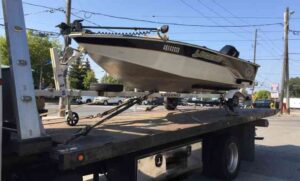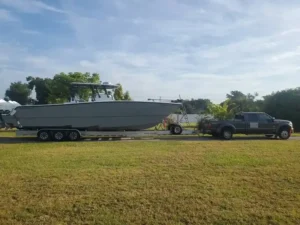The industrial and commercial landscape of Oshawa, Ontario, is a dynamic environment where the movement of goods is paramount. A crucial component of this logistical chain is the transportation of sea containers, the standardized steel boxes that facilitate global trade. Whether for storage, mobile offices, or transporting goods inland from the Port of Oshawa, the need for safe, efficient, and legally compliant sea container towing services is significant. This in-depth guide will explore the intricacies of towing sea containers in Oshawa, from regulatory requirements and safety protocols to choosing the right towing partner for this specialized task.
Oshawa’s strategic location on the shores of Lake Ontario, coupled with its robust industrial sector, makes it a key hub for commerce. The Port of Oshawa, a major inland port, handles a diverse range of cargo, including steel, asphalt, and grain. As businesses increasingly utilize sea containers for a variety of purposes beyond international shipping—such as on-site storage for construction projects, pop-up retail spaces, and even modular housing components—the demand for reliable local and regional transport of these containers has surged
- Learn More >>>>> Towing sea containers
Towing Sea Containers in Oshawa: A Comprehensive Guide
Navigating the Regulatory Maze: Permits and Legal Requirements
Towing sea containers in oshawa is classified as transporting an oversized load, which is subject to a stringent set of regulations at both the provincial and municipal levels. Failure to comply can result in significant fines, delays, and even the impounding of the container and vehicle.
Provincial Regulations: The Highway Traffic Act
The Ontario Ministry of Transportation (MTO) sets the overarching rules for oversized loads on provincial highways. The Highway Traffic Act outlines the maximum permissible dimensions and weights for vehicles and their loads. Any sea container exceeding these standard limits requires a special permit.
- Learn More >>>>> Oshawa Towing Service
Municipal Regulations: The City of Oshawa and Durham Region
For movements within the city limits, additional permits are required from the City of Oshawa. The city has specific bylaws governing oversized loads to protect municipal infrastructure, ensure traffic flow, and maintain public safety. Similarly, if the transport route includes roads under the jurisdiction of the Durham Region, a separate permit from the region is necessary.
A permit application for an oversized load in Oshawa typically requires:
- Detailed Route Plan: The proposed route must be carefully planned to avoid low bridges, power lines, and other potential obstructions. The city may require a route survey for particularly large or heavy loads.
- Proof of Insurance: A significant amount of liability insurance is mandatory to cover any potential damages during transport.
- Vehicle and Load Specifications: The exact dimensions (length, width, and height) and weight of the sea container and the transport vehicle must be provided.
- Escort Vehicle Requirements: Depending on the size of the container, the city may mandate the use of one or more escort vehicles to ensure the safety of other road users. These “pilot” cars are equipped with flashing lights and signage to warn of the oversized load.
For businesses looking to transport sea containers, navigating this dual layer of provincial and municipal bureaucracy can be a daunting task. This is where a professional towing company with experience in oversized loads becomes an invaluable asset. A reputable provider will handle the entire permitting process, ensuring full compliance and a hassle-free experience for their clients.
- Learn More >>>>> Heavy Duty Towing Service
The Right Equipment for the Job: More Than Just a Tow Truck
Towing sea containers in oshawa, which can weigh anywhere from 2 to 4.5 metric tons empty, requires highly specialized equipment. A standard tow truck is simply not up to the task. The primary methods for transporting sea containers over land include:
- Tilt-and-Load Trucks: These are the most common vehicles used for local and regional container transport. They feature a bed that tilts down to the ground, allowing a container to be winched on and off. This method is efficient for deliveries to sites with relatively level and firm ground.
- Flatbed Trailers: For longer distances or for transporting multiple containers, a flatbed trailer pulled by a powerful tractor is the preferred option. Loading and unloading a container from a flatbed typically requires a crane or a large forklift at both the origin and destination.
- Chassis Trailers: These are specialized trailers designed specifically to carry sea containers. The container is secured to the chassis using standardized twist-locks, the same mechanism used on ships and trains.
The choice of equipment depends on several factors, including the size and weight of the container (standard 20-foot and 40-foot containers are the most common), the distance of the journey, and the site conditions at both the pickup and delivery locations. A professional towing service will assess these factors and dispatch the appropriate vehicle for the job.

- Learn More >>>>> Flatbed Towing oshawa
Safety First: Best Practices for Sea Container Towing
The safe transport of a sea container is a non-negotiable priority. The sheer size and weight of these units present significant risks if not handled correctly. A professional towing operation will adhere to a strict set of safety protocols, including:
- Proper Weight Distribution: Ensuring the container is balanced on the trailer is crucial for stability on the road. An improperly loaded container can lead to swaying, tipping, and a catastrophic accident.
- Securement: The container must be securely fastened to the trailer using all required chains, straps, and twist-locks. These connections should be inspected before departure and re-checked during the journey.
- Route Planning and Hazard Identification: As mentioned earlier, a thorough route plan is essential. This includes identifying potential hazards such as tight turns, steep grades, and areas of heavy traffic.
- Experienced Operators: The driver of the transport vehicle must be experienced in handling oversized loads. They need to be aware of the increased stopping distances, the larger turning radius, and the impact of wind on the container.
- Clear Communication: Effective communication between the truck operator, any escort vehicle drivers, and the client is vital for a smooth and safe operation.
For those considering the do-it-yourself route for moving a sea container, the risks far outweigh any potential savings. The potential for accidents, damage to the container and property, and legal penalties makes professional assistance the only prudent choice.
- Learn More >>>>>Light Duty Towing oshawa
Choosing a Professional Towing Service in the Aurora and Oshawa Area
When selecting a towing company for sea container transport in the Oshawa and Aurora region, it is crucial to look for a provider that demonstrates expertise, professionalism, and a commitment to safety. A company like Pars Towing, with its focus on a wide range of towing services, exemplifies the type of professional operation businesses should seek. While Pars Towing’s primary service area is currently in Las Vegas, a hypothetical expansion into the Ontario market would necessitate a deep understanding of the local regulations and logistical challenges discussed here.
Here are key factors to consider when choosing a towing partner:
- Experience with Oversized Loads: Inquire about their track record in transporting sea containers and other large items. Ask for references or case studies.
- Proper Licensing and Insurance: Verify that the company is fully licensed to operate in Ontario and carries adequate insurance to cover your valuable cargo.
- Comprehensive Service: A full-service provider will not only transport the container but also assist with logistics, planning, and the all-important permitting process.
- Modern and Well-Maintained Equipment: The quality of their fleet is a direct reflection of their commitment to safety and reliability.
- Transparent Pricing: Request a detailed quote that outlines all costs, including transport, permits, and any required escort services. While cost is a factor, the cheapest option may not be the safest or most reliable.
- Local Knowledge: A company familiar with the roads and regulations in Oshawa and the Durham Region will be better equipped to handle the move efficiently and without unforeseen complications.
The Cost of Towing a Sea Container in Oshawa
- Learn More >>>>> What to Look for in a Reliable Towing Company in Ontario?
The cost of towing a sea container is influenced by several variables, making it difficult to provide a single, one-size-fits-all price. Factors that will impact the final quote include:
- Distance of Transport: Longer journeys will naturally incur higher costs due to fuel, driver time, and potential overnight stays.
- Size and Weight of the Container: Larger and heavier containers may require more robust and specialized equipment, which can increase the price.
- Permit Fees: The cost of municipal and regional permits will be factored into the overall price.
- Escort Vehicle Requirements: If pilot cars are needed, this will add to the total cost.
- Site Accessibility: Difficult-to-access pickup or delivery locations that require additional time or specialized maneuvering may result in higher charges.
- Need for Additional Equipment: If a crane or forklift is required for loading or unloading, this will be an additional expense.
It is advisable to obtain quotes from multiple reputable towing companies to ensure you are receiving a fair and competitive price for the services required.
Conclusion: Your Trusted Partner in Sea Container Logistics
The movement of sea containers in Oshawa is a specialized task that demands a professional touch. From the complexities of obtaining the correct permits to the critical importance of safety and the use of appropriate equipment, there are numerous factors that underscore the need for an experienced and reliable towing partner.








